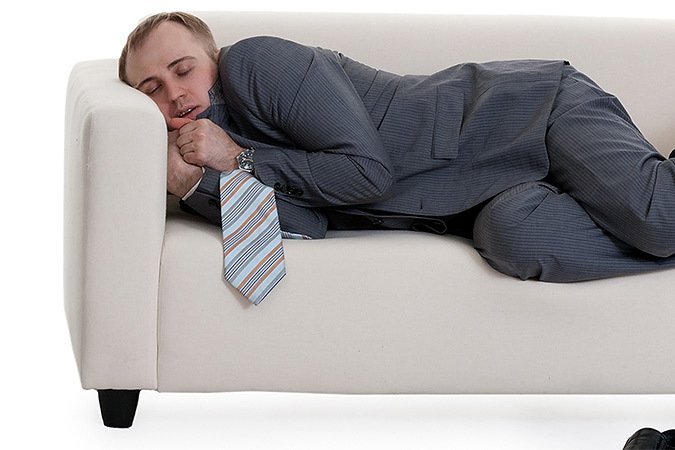Why daytime naps are beneficial. What are the health risks of long sleep?
Daytime sleep helps the brain “reboot”, look at the problem from the other side and accept correct solution.
Sleeping during the day is useful and necessary, and this fact is recognized by sleep specialists. Daytime sleep has a beneficial effect on the condition of cardio-vascular system. If you sleep for 45 - 60 minutes after a strong stressful situation, then jumped blood pressure goes down and returns to normal. The body is restored, and the person is ready to work again.
Many successful people They think that they need to poke around during the day after a busy first half of the day:
Winston Churchill first coined the term "restorative sleep", arguing that afternoon nap helped restore the clarity of thinking necessary for decision-making in wartime. He argued that he needed to get some sleep between lunch and dinner.
Margaret Thatcher strictly forbade her assistants to disturb her between 14.30 and 15.30, because that was when she rested.
Bill Clinton He also asked not to disturb him at 3 o’clock in the afternoon.
Leonardo da Vinci I slept several times a day, so I created at night.
Napoleon Bonaparte I didn’t deny myself naps during the day.
Although, Thomas Edison was not happy with his habit of sleeping during the day, he performed this ritual daily.
Eleanor Roosevelt, President Franklin Roosevelt's wife regained her energy with naps before important speeches.
The president John Kennedy I dined in bed every day and then slept soundly.
Other famous daytime nappers include Albert Einstein and Johannes Brahms.

 Sleeping during the day restores vigor. It is recommended to sleep for only 20-30 minutes to restore performance and attention. Such short-term sleep will not cause bad sleep at night.
Sleeping during the day restores vigor. It is recommended to sleep for only 20-30 minutes to restore performance and attention. Such short-term sleep will not cause bad sleep at night.
Daytime naps prevent burnout. IN modern world people run, run non-stop, striving to achieve their goals. And in this running without respite, a person is subject to stress, physical and physical exhaustion. mental strength, disappointment.
Daytime sleep restores the body, reduces stress, and makes it possible to rethink the situation.
Sleep enhances sensory perception. Daytime sleep allows you to enhance the acuity of the senses (vision, hearing, taste). Increases after sleep creative activity, because the brain relaxes and new ideas arise.
Daytime naps reduce the risk of cardiovascular disease. Those who take naps at least 3 times a week reduce their risk of heart disease by 40%. Scientists claim that nap– a powerful weapon against myocardial infarction .
Daytime naps improve productivity. Numerous medical studies have found that workers become unproductive during the second half of the workday. And just 30 minutes of napping is enough to restore workers' productivity and bring productivity back to the level it was at the beginning of the day.
Daytime naps at work

 For most of us, rest after lunch, and even in bed, is absolutely inaccessible. Many companies are changing their attitude towards daytime rest for employees and becoming more loyal. It is easiest for those who travel by car to find a quiet place for a daytime nap. You can have privacy in the car, install the seat in comfortable position and sleep. It is also good for those who have a separate office with a comfortable chair. And it's best for freelancers who work from home, so they can lie down in bed and take a good nap.
For most of us, rest after lunch, and even in bed, is absolutely inaccessible. Many companies are changing their attitude towards daytime rest for employees and becoming more loyal. It is easiest for those who travel by car to find a quiet place for a daytime nap. You can have privacy in the car, install the seat in comfortable position and sleep. It is also good for those who have a separate office with a comfortable chair. And it's best for freelancers who work from home, so they can lie down in bed and take a good nap.
The habit of sleeping during the day reduces the risk of death from a heart attack by almost 40%, experts have found
Sleep regularly. Try to set aside time for naps every day. This will allow you to establish daily biorhythms and increase productivity.
Don't sleep long. If you sleep for a long time and soundly, then a state of intoxication and a feeling of disorientation appears. It is recommended to sleep for 20-30 minutes. Set an alarm on your phone so you don't oversleep. Also, long naps during the day can affect the quality of night sleep.
Without light. Light acts on the human body as a signal to action. The body’s natural reaction to darkness is to “shut down” or “go into standby mode.” If you can't turn off the light, you can use a sleep band.
The first thought that comes to me in the morning when I see my own half-closed eyes in the mirror: “Today I’ll go to bed at nine o’clock in the evening!” A sleepy body calls you back to the warm duvet world so much that it is very difficult not to succumb to temptation. And I give in. “Just a minute” ends up being a whole hour late for work.
But the most interesting thing happens during the day: fatigue puts pressure on every cell of the body and forces you to look for a secluded corner to take a nap there, right in the middle of the working day! Has this ever happened to you?
For the time being, I thought it was abnormal to want to sleep during the day. But then I found out that Daytime sleep is a completely natural need. In South American countries it is even customary to organize “ quiet time” – when, after a lunch break, employees lock themselves in their offices and just... sleep.
American sleep expert Scott Campbell called napping a healthy habit. He explains this by saying that his own body tells a person to take a nap after lunch, and there is no point in “turning a blind ear” to these prompts. If you don't listen inner voice and not rest for a few minutes, our strength will quickly be exhausted.
Benefit from short nap proven by science. Experts in this field say that The biological clock Each of us is configured in such a way that we need to sleep twice a day. The first is from midnight to seven in the morning, and the second is from one to three in the afternoon.
What is the reason for this natural need? With the cold. It is during these periods of time that our body temperature drops, and this does not depend on diet and rest.
Many studies show that a short nap of 15 minutes increases physical and brain activity. After a slight “break,” the mood improves in both children and adults. And afternoon naps are especially beneficial for older people.
And yet, every medal has a downside. Some scientists explain the desire to sleep in broad daylight with laziness and the presence of serious illnesses. So, if older men and women like to lie down after lunch, this may be an alarm bell for a stroke. This hypothesis is confirmed by research, which found that people experiencing urgent need in daytime sleep, are two or even four times more susceptible to strokes.
What explains this paradox? It turns out that shallow, superficial sleep (and this is often what daytime naps are) provokes disruptions blood pressure. Such jumps lead to cerebral hemorrhage.
But don’t be alarmed, the researchers reassure. You only need to sound the alarm when you sleep enough during the day and are not overtired, but the bed still calls you for a date during the day.
For young people, the desire to sleep during daylight hours is completely normal, if not inevitable. After all, it is young people who most often lack sleep at night and are in dire need of recuperation. Experts from Harvard have concluded that just 60 minutes of daytime sleep can restore brain function in the same way as a full night's rest. To establish this fact, they recruited volunteers who slept for 20 minutes before taking an attention and memory test. Such young people showed more good results than those who do not sleep during the day, and after 40 minutes or an hour of daytime sleep their mental capacity and even increased.
So, you and I have to determine the harmfulness and usefulness of daytime sleep for ourselves. And yet, I will say, based on personal experience: sleep whenever you want, because you deserve it. ;)
First of all, it should be noted that there must be balance in everything, that is, wakefulness must be balanced by sufficient sleep and vice versa, so that a person can feel rested. When this balance is disturbed, problems immediately appear of different nature such as insomnia, high irritability or laziness, as well as problems directly related to health. Based on these facts, it can be argued that both lack of sleep and very long sleep are equally harmful to the human body.Benefits of long sleep
Prolonged sleep may be beneficial in cases that depend on physical and morale person. For example, in case of overwork, daily heavy physical activity and lack of opportunity to get a good night's sleep. In this case, a lack of sleep accumulates in the body, all human resources are depleted at a certain point and in order to fully recover, a person will need more time to rest.In cases where a person is too exhausted, sleep can last a day. A sick person will need the same amount of time to regain his strength.
The harm of long sleep
The harm of long sleep is based on overwork, into which a person plunges when there is an excess of the sleep hormone. With excessively long sleep, the body begins to get tired, and as a result, it does not regain strength, but loses it. Long sleep also destroys the internal course of the biological clock, and therefore, to a certain extent, restructures the functioning of the body. As a result, the level of laziness and unwillingness to do something increases. The result can be severe stress and a high risk of depression.Often, long sleep serves as a conscious escape from problems, that is, “I’m sleeping, which means I don’t see anything, I don’t solve anything.” This is the basis of many psychological diseases, the emergence of new ones and the strengthening of old complexes. Concerning physical health, prolonged sleep can lead to an increase in migraines, stagnation of blood in the vessels, high blood pressure, swelling of varying degrees.
Conclusion
What, exactly, is long sleep, how long does it last? Doctors say that the normal duration of sleep and wakefulness for a certain person its. But there is an approximate distinction by which you can find out whether a person is sleeping within normal limits. So, sleep is considered long if its duration exceeds 10-14 hours or more. Therefore, for a person who only needs 7-8 hours of sleep, 10-11 hours is already too much. The distinctions are arbitrary, but they help to navigate the calculations of time spent on sleep.If you take into account how difficult everyday life can be, sometimes the desire to wake up disappears altogether. The bed is so warm and the sleep is so sweet. However, the question arises: is it safe to sleep half a day after a sleepless night or a difficult work week? Is the harm of long sleep equivalent to lack of sleep?
First of all, it should be noted that there must be balance in everything, that is, wakefulness must be balanced by sufficient sleep and vice versa, so that a person can feel rested. When this balance is disturbed, various problems immediately appear, such as insomnia, high irritability or laziness, as well as problems directly related to health. Based on these facts, it can be argued that both lack of sleep and very long sleep are equally harmful to the human body.
Benefits of long sleep
Long sleep can be beneficial in cases that depend on the physical and moral state of a person. For example, with overwork, daily heavy physical activity and lack of opportunity to get a good night's sleep. In this case, a lack of sleep accumulates in the body, all human resources are depleted at a certain point and in order to fully recover, a person will need more time to rest.
In cases where a person is too exhausted, sleep can last a day. A sick person will need the same amount of time to regain his strength.
Harm long sleep
The harm of long sleep is based on overwork, into which a person plunges when there is an excess of the sleep hormone. With excessively long sleep, the body begins to get tired, and as a result, it does not regain strength, but loses it. Long sleep also destroys the internal course of the biological clock, and therefore, to a certain extent, restructures the functioning of the body. As a result, the level of laziness and reluctance to do something increases. The result can be severe stress and a high risk of depression.
Often, long sleep serves as a conscious escape from problems, that is, “I’m sleeping, which means I don’t see anything, I don’t solve anything.” This is the basis of many psychological diseases, the emergence of new ones and the strengthening of old complexes. As for physical health, prolonged sleep can lead to an increase in migraines, stagnation of blood in the vessels, high blood pressure, and swelling of varying degrees.
Conclusion
What, exactly, is long sleep, how long does it last? Doctors say that the normal duration of sleep and wakefulness is different for a particular person. But there is an approximate distinction by which you can find out whether a person is sleeping within normal limits. So, sleep is considered long if its duration exceeds 10-14 hours or more. Therefore, for a person who only needs 7-8 hours of sleep, 10-11 hours is already too much. The distinctions are arbitrary, but they help to navigate the calculations of time spent on sleep.
I went to bed at one in the morning and got up at half past four in the afternoon. I probably would have slept more if I didn’t want to eat. Got up in in good condition, but after an hour or two I had a headache. Coincidence or due to “oversleeping”? And why do we sometimes want to sleep for so long, because we weren’t particularly tired before bedtime?
Comments: 26 »
This is usually associated with nervous fatigue or loss of strength. If such long sleep does not happen too often, then I think there is no need to worry.
As a rule, ideally a person should sleep 7-8 hours, but this is not always the case, sometimes we sleep for a long time and sometimes not enough, so the body gets its way. The head most likely ached not because of too much sleep, but for other reasons, the weather, migraine, etc. d.
Firstly It’s clear that biorhythms are disrupted. YOU compensated by sleeping long hours for the fact that you went to bed very late. Man, like all living things, directly depends on the sun. During the day, the body feels cheerful, it is tuned to work, to stay awake. In this case, you slept through this period. Hence the migraine. It turned out that your period of wakefulness turned out to be night, an unusual biorhythm was imposed on your body, and everything turned upside down as a result. You can see the result of this activity for yourself - bad feeling. Recently, scientists are generally inclined to believe that sleeping more than 8 hours is harmful.
Sleep is useful and simply necessary for a person and his health. You just need to sleep at night, that is, do not disturb your biological clock, otherwise such sleep will have little benefit.
It's actually more of a coincidence. Yes, it’s really not advisable to throw off your biological clock, but the fact that you slept for so long indicates that you didn’t get enough sleep for a long time, and the body just took its toll.
with regular oversleeping, “Hypersomnia” may develop and this disease will no longer get rid of, in addition to memory problems and constant fatigue.
Never believe studies conducted on selected people and even older people. This is a huge misconception. This is fundamentally wrong. It's like trying to determine the abilities of a rusty car.
People sleep as much as they need, everyone needs different time. There are and cannot be any boundaries or restrictions here.
Normal sleep duration is 7-8 hours a day. According to doctors, prolonged sleep impairs blood circulation, which can cause blood clots to form in the heart and brain. Depression and loss of strength occur.
Perhaps you simply interrupted the deep sleep phase. Human sleep consists of 4 phases, the last of which is the deep sleep phase. If sleep is interrupted during this phase, the sleeper experiences a feeling of weakness, headaches, and confusion. The number of hours per day allocated to sleep is purely individual.
This is connected and how, I can tell you from my own experience, I used to often sleep like you, and you get very tired from such a long sleep, this is not very normal for us and therefore the body reminds us of this with fatigue, headaches, apathy, and so on. .
It has now been proven by scientists that long sleep does not bring any benefit to the body, than more people he sleeps, the more he wants to sleep and the stronger his feeling of weakness and fatigue.
It all depends on the rhythm in which you live. If you work a lot and are on your feet, then naturally you will want to sleep longer. Well, if there is no load, then you should not sleep for a long time - 8-9 hours is enough.
Of course, you have a headache due to prolonged sleep. After all, this is an unusual regime for your body. This is how he reacted. But if you don’t have such long dreams very often, then you don’t need to worry too much.
If you are a healthy person, then your poor health after a long sleep is one hundred percent “oversleep”. I often had this and subsequently always had a migraine, now no matter how late I have to go to bed, I set the alarm for 8-00, and during the day I feel tired I try to lie down to rest for no more than half an hour, it helps a lot.
According to my personal feelings, long sleep is harmful. If I sleep for more than 8 hours, then I can’t really wake up for a long time. Appears headache, dizziness and bad mood.
It is very harmful to sleep like this, a person should sleep at night and normal sleep is 7-8 hours, so you had a headache, the reason for long sleep can be stress or various health problems, but this is a one-time thing, so reconsider your lifestyle and set an alarm clock.
Long sleep is harmful.
Sleep is a special state of both humans and animals. The structure of sleep is divided into several cycles, the cycle is divided into several stages. The 1st stage is slow-wave sleep, which lasts 5-10 minutes. The 2nd stage is REM sleep 20 minutes. and the 3rd and 4th stages are 35-40 minutes and all over again, which will constitute the sleep phase.
This always happens to me too, I feel terrible after an overdose of sleep. Already knowing the symptoms, I try not to repeat it.
It seems to me that before the weekend it would be possible to sleep longer, but you get up at the usual time for work, but when you have to go to work, you don’t want to get up. And also, in my opinion, I want to sleep longer in rainy autumn weather.
I sleep for a very long time, sometimes I don’t get up for school, I sleep like a mortal, why is this?
Sleep is beneficial if you sleep in certain time. You need to go to bed before 12 am, otherwise the biological clock is disrupted and you need to sleep no more than 8 hours!
I had the same problem. This is most likely due to problems with nervous system or simply overtired. Usually, 7-8 hours are enough for a person to good night. I used to sleep for 12 hours, then I started setting an alarm and forcing myself to wake up at a normal time.
Quite often the reason is the weather. It’s also important to follow a routine, because the body cannot rest properly if you constantly lack sleep and then try to catch up. The best thing is to go to bed before 10 pm and get up before 8 am. Then your head will not hurt, and your rest will be complete.



